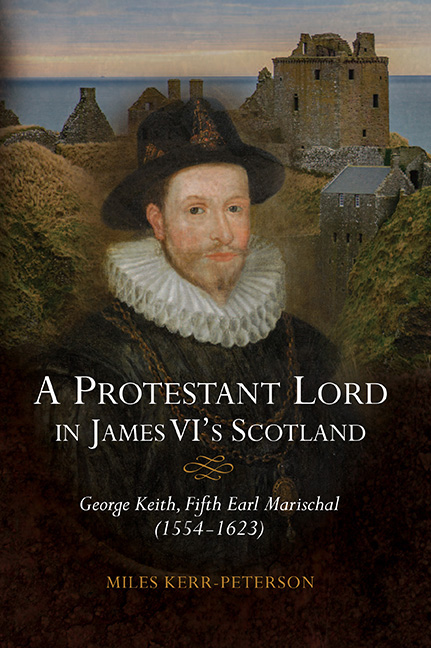Book contents
- Frontmatter
- Contents
- List of Illustrations
- Acknowledgements
- Conventions
- Abbreviations
- Map
- Introduction
- 1 Inheritance and Education, 1513–1582
- 2 Three Feuds and Jacobean Politics, 1582–1595
- 3 Service to the State, 1595–1623
- 4 Defending the Borders of the Earldom, 1595–1623
- 5 Family Strategies and Crises, 1595–1623
- 6 Lordship and the Reformed Kirk, 1560–1623
- 7 Economic Activities, 1581–1623
- 8 Marischal College, 1593–1623
- Conclusion
- Appendices: Genealogies
- Bibliography
- Index
- St Andrew Studies in Scottish History
8 - Marischal College, 1593–1623
Published online by Cambridge University Press: 13 April 2019
- Frontmatter
- Contents
- List of Illustrations
- Acknowledgements
- Conventions
- Abbreviations
- Map
- Introduction
- 1 Inheritance and Education, 1513–1582
- 2 Three Feuds and Jacobean Politics, 1582–1595
- 3 Service to the State, 1595–1623
- 4 Defending the Borders of the Earldom, 1595–1623
- 5 Family Strategies and Crises, 1595–1623
- 6 Lordship and the Reformed Kirk, 1560–1623
- 7 Economic Activities, 1581–1623
- 8 Marischal College, 1593–1623
- Conclusion
- Appendices: Genealogies
- Bibliography
- Index
- St Andrew Studies in Scottish History
Summary
On 2 April 1593, a month into his frustrating stint as Lieutenant of the North, George Keith, fifth Earl Marischal, signed the foundation charter of what became Marischal College. A little over a year later (20 September 1594) this document, now ratified, was handed to the first principal, Robert Howie, completing the process. Marischal College is the best known of the earl's achievements, and the most visible, its grand Gothic Revival building being the centrepiece of modern Aberdeen. As such, the creation of the college has been relatively well discussed compared to the rest of Marischal's life. Yet the existing interpretations of the college largely fail to understand Marischal's own motivations and especially his motivations as a nobleman. It is within this context, of Scottish lordship and patronage, that the foundation and subsequent history of Marischal College makes the most sense. Marischal College is thus an excellent and well-documented case study of how the Earl Marischal approached matters of lordship.
That said, the work that has been done on the creation of Marischal College is very important. The college's creation was first understood as a reaction to Aberdeen's other university, King's College in Old Aberdeen. The idea that Marischal College was somehow a Protestant tank on the lawn of Catholic King's has been thoroughly debunked – King's was Protestant by the time Marischal College came into being. However, a refinement of this initial idea is that Marischal College was a result of the failure of King's to modernise. First set forward by Robert Sangster Rait in 1895, this interpretation sees the college as a direct response to the failure of King's College to adopt its nova fundatio ‘new foundation’, a series of teaching and administrative reforms inspired by Andrew Melville's successful re-establishment of Glasgow in 1577. This would have rejected Bishop Elphinstone's original ambitious foundation of 1495 and turned King's into a liberal arts college on the Genevan model. The Earl Marischal had been involved with these failed reforms and is therefore seen as seeking to address this failure through founding a new institution.
Others have turned away from this idea and sought to see the founding of Marischal College as the result of the earl's other preoccupations.
- Type
- Chapter
- Information
- A Protestant Lord in James VI's ScotlandGeorge Keith, Fifth Earl Marischal (1554–1623), pp. 167 - 188Publisher: Boydell & BrewerPrint publication year: 2019



